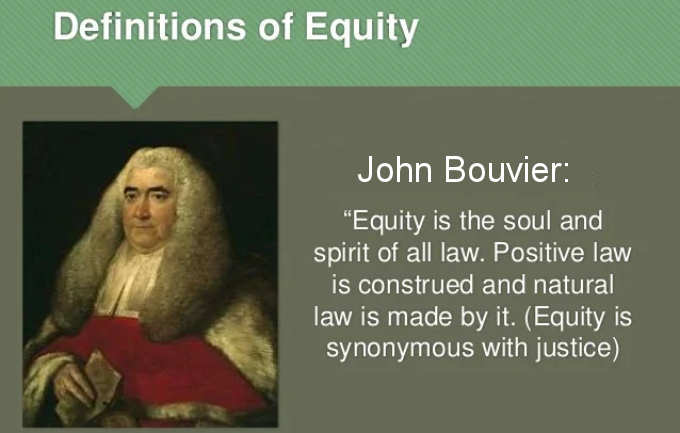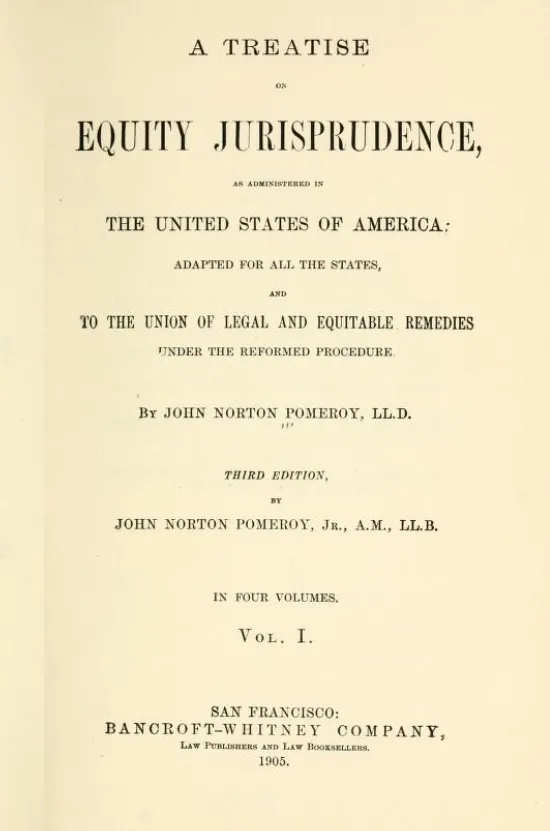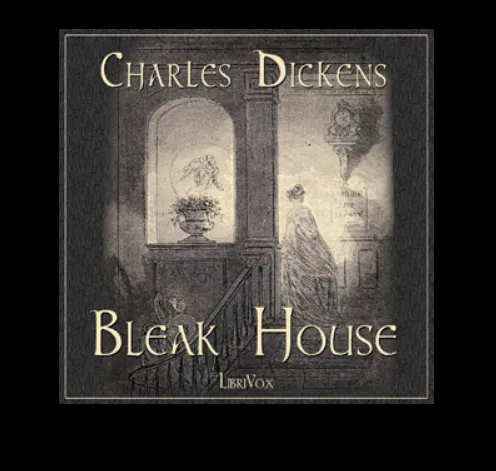.gif)
![]()
|
|
Equity: "Law is nothing without equity, and equity is everything, even without the law. Equity, in its true and genuine meaning, is the soul and spirit of the law; ..."
By Some, April 22, 2022
Equity: A brief history of its Jurisdiction and jurisprudence

![]() n my second article on Equity, its Jurisdiction and jurisprudence, I endeavor to detail a massive topic in these articles where Giants of Equity understanding have pressed thousands of pages to explain both the Jurisdiction and its jurisprudence (rules of how to move suits the jurisdiction). [read the first article here:
n my second article on Equity, its Jurisdiction and jurisprudence, I endeavor to detail a massive topic in these articles where Giants of Equity understanding have pressed thousands of pages to explain both the Jurisdiction and its jurisprudence (rules of how to move suits the jurisdiction). [read the first article here:
https://somethoughtstoclearmyhead.substack.com/p/equity-do-we-have-any-idea-what-it?s=w]
Giants like John Norton Pomeroy, John Bouvier, John Adams, Charles Edward Phelps, Henry R. Gibson. These names are known as "unwritten authorities" meaning the "authority" they bring is not IN statute, as statutes and codes on the public rolls are known as "written authorities".
"Law is nothing without equity, and equity is everything, even without the law. Those who perceive what is just and what is unjust only through the eyes of the law, never see it as well as those who behold it with the eyes of equity. Law may be looked upon, in some manner, as a assistance for those who have a weak perception of right and wrong, in the same way that optical glasses are useful to those who are short sighted, or whose visual organs are deficient. Equity, in its true and genuine meaning, is the soul and spirit of the law; positive law is construed, and rational law is made by it."
John Bouvier, institutes of American Law, vol. 4, 1854. sec Pg 100 sec 3724 Para 5
The first I was introduced to, by a man named Christian Walters (sadly deceased, brilliant man), was John Norton Pomeroy's "A treatise on equity jurisprudence, as administered in the United States of America; adapted for all the states, and to the union of legal and equitable remedies under the reformed procedure" (1). In his first volume this esteemed author wrote a preface to it that foreshadowed the harms that may befall a society that allowed the "merger" of "law and equity" into one court system. There had always been a separation between the two systems as Equity being the spirit of the law was for the sentient man and his real issues that deal with rights to go for redress, and the common law was the letter of the law that was harsher as it dealt with "contract" law.

Pomeroy wrote that merging would confuse people and their ability to have equity deal with their issues obscured from their view and bring a ton of business to the "at law" common law courts. This is a quote from his forward:
"Since the first New York Code of Practice in 1848, about one-half of the states and territories have adopted the Reformed Procedure. As the central conception of this system is the abolition of all external distinctions between actions at law and suits in equity, the union of legal and equitable rights and remedies in one proceeding, and the substitution of many important equitable in place of legal methods, it was confidently supposed that in progress of time the doctrines of equity would obtain a supremacy over those of the law in the administration of justice, and that the entire jurisprudence of a state would gradually become more equitable, more informed with equitable notions. It must be confessed, I think, that the experience of the past thirty years in these states points to a directly contrary result. Every careful observer must admit that in all the states which have adopted the Reformed Procedure there has been, to a greater or less degree, a weakening, decrease, or disregard of equitable principles in the administration of justice. I would not be misunderstood. There has not, of course, been any conscious intentional abrogation or rejection of equity on the part of the courts. The tendency, however, has plainly and steadily been towards the giving an undue prominence and superiority to purely legal rules, and the ignoring, forgetting, or suppression of equitable notions."
John Norton Pomeroy vol 1 A treatise on equity jurisprudence
pg 18 of preface
This new reformed system in the US was put into effect in the 1930's and "Erie v Thompkins" was its first "test" suit. The very first suit that was set in the merged system to be dealt with. The very first suit that did not get sent to either "Equity Court" OR "Common law Court/legal court". The filer now had to be savvy of what remedy he was filing for to make sure it lined up with the "new" jurisdiction of at law/equity.
As we mentioned the two courts and the different business they dealt with, this would be a good time to speak to the novel "Bleak House" and what it meant for the "revisionist" history they wanted to make about the "Exclusive Extraordinary Equity Jurisdiction".

Bleak house speaks to the Court of Equity (2), and purports to show how people who take part in trying to use it to further their gains will just get hurt and some financially crushed. They will get lost in the "hopes" that the novel infers the court brings. Lies, all lies. This novel seems to this writer to be a "hit piece" from the 1800's to smear something the powers that be did not want the people to stop trusting. Dickens did the same thing with Xmas, inputting it into societies mindset and not addressing the non christian side of "Christmas". (This is for another article. But I will say that it is said that Dickens seems to have not like a certain man of religion at that time, an"Ebenezer Erskine" who preached against Xmas. So Dickens may have memorialized him for all time in the man everyone loves to hate, Ebenezer Scrouge. (3)). It seems that, because the court of Equity was (and still is) capable of dealing with the legal side of an issue AND the equitable side, people were choosing to go to the Court of Equity to deal with their matters. Equity of course can align all rights as against all other rights of parties in an issue. Common law/Legal courts could not and still cannot deal with "THE WHOLE MATTER" and leave people to getting a money award (pecuniary) for their issue and they NEVER get the equitiers aligned by the court to gain the full remedy. Man was always fooled by money. Rights are priceless. Ever since Erie v Thompkins (in Canada is was a bit later in all provinces as there is no "Court of Equity" in the Canadian Supreme Court as its a statutory court and I do no believe it has been given the original exclusive Equity Jurisdiction in its statutory details of what its power are. However, Erie v Thompkins was US FED first "reform" procedure suit.
People have had the courts hide equity from their eyes since Erie v Thompkins and the judicature acts, but of course it started with the English Judicature act Pomeroy speaks of above. Equity does not hold cases/suits where there is "controversy". Equity, as it has the suits laid out for it via its jurisprudence, deals with truths that are irrefutable and the one who claims issue in Equity must show a clear right has been effected in the negative and that they have been harmed. Legal land thrives on controversy and "arguing". You don not have "final arguments in an "Equity suit". In equity you either have the right for the remedy, or you do not. If you don't dismissed. If you do, remedy gets decreed. Its a beautiful system when you study it.
This is Pomeroy referenced in a Suit in the 1980's from Florida. It speaks to how many times "Equity" authorities were used to press an "equitable remedy" and using therefore exclusively "equity jurisprudence". Law schools stopped teaching on Equity in any substantive amounts, certainly not having whole law schools dedicated to Equity as it should be...they hid it from our eyes and set legal land "colorable" law...when we only need black and white equity jurisdiction and know how to NOT press an legal matter in court...."In the preface to the first edition of his text book on Equity Jurisprudence in May, 1881, Professor John Norton Pomeroy was greatly concerned about the disastrous consequences of the then tendency to abolish the external distinctions between actions at law and actions in equity, the union of legal and equitable rights and remedies in one proceeding and the substitution of legal and equitable methods. Perhaps history will note that the rise and decline of Equity as a separate and distinct body of substantive law in Florida as paralleling the frequency with which reported Florida cases referred to Pomeroy's Equity Jurisprudence over the decades, which is illustrated as follows: 1890's — 1; 1900's — 3; 1910's — 5; 1920's — 11; 1930's — 40; 1940's — 28; 1950's — 24; 1960's — 23; 1970's — 9; 1980's — 4 to date, with this opinion being the fifth. Similarly, cases citing Story, Commentaries on Equity Jurisprudence (1884) are as follows: 1900's — 1; 1910's — 0; 1920's — 1; 1930's — 5; 1940's — 2; 1950's — 2; 1960's — 0; 1970's — 2; 1980's — 1 to date with this opinion being the second."(4)This was definitely a HUGE move by the CROWN to keep us away from a better jurisdiction that is NOT MEANT FOR CORPORATIONS..
We in present day think equity is a woke deal to hire untrained people because of their skin color or sexual orientation. Wrong. Equity jurisdiction and the jurisprudence uses higher teaching, mature teachings, and allows us to be way more streamlined in our thinking and in our daily doings when we understand it. Its about RIGHTS, and an EQUITY is a RIGHT/INTEREST in something. Here is what Woodrow Wilson said before he became potus. We should never claim anything as a member of anything "aggregate" because all of the aggregate will get the bare minimum of what is avail:
"Liberty is always PERSONAL, never in the aggregate: always a thing inhering in individuals taken singly, never in groups or corporations or communities. The individual unit of society is the INDIVIDUAL."(6)
The Hon. Woodrow Wilson,in his cogent address entitled "The Lawyer and the Community," before the American Bar Association, at Chattanooga, Tenn., August 31, 1910. PG 9 of pdf
Look up the Duplessis Orphans from Quebec in the 1960's to see what a gov can and will do to take care of the aggragate public.(5)
Next time we will look at "Juridical equity : abridged for the use of students" by Charles E. Phelps (7) and John bouvier and see what these masters of equity could tell us of this (by gone? Nope) jurisdiction in western courts called "Equity". And since I did not want to put too much information in this article, we will go over the disagreement between Lord Coke and Lord Ellesmere known as "The Earl of Oxfords case" and how Equity won over the common law jurisdiction and prevails to this day as the "better" jurisdiction.(7).
1/ https://archive.org/details/nortonequity01pome/page/n7/mode/2up
2/ https://archive.org/details/bleak_house_cl_librivox
3/ The select writings of the Rev. Ebenezer Erskine : Vol. I. Doctrinal sermons: https://archive.org/details/selectwritingsof01ersk
4/ http://scholar.google.com/scholar_case?case=14180904361479507772&q=Hutchens&hl=en&as_sdt=2,14&as_ylo=1988&as_yhi=1989
5/ https://ia800203.us.archive.org/19/items/cu31924024932513/cu31924024932513.pdf
6/ https://historyofrights.ca/encyclopaedia/main-events/duplessis-orphans/
7/ https://www.lawteacher.net/free-law-essays/equity-law/conflict-between-common-law-and-equity-equity-law-essay.php
URL for this article: NewsBitsAndBites.com/article3/law_is_nothing_without_equity-url.shtml